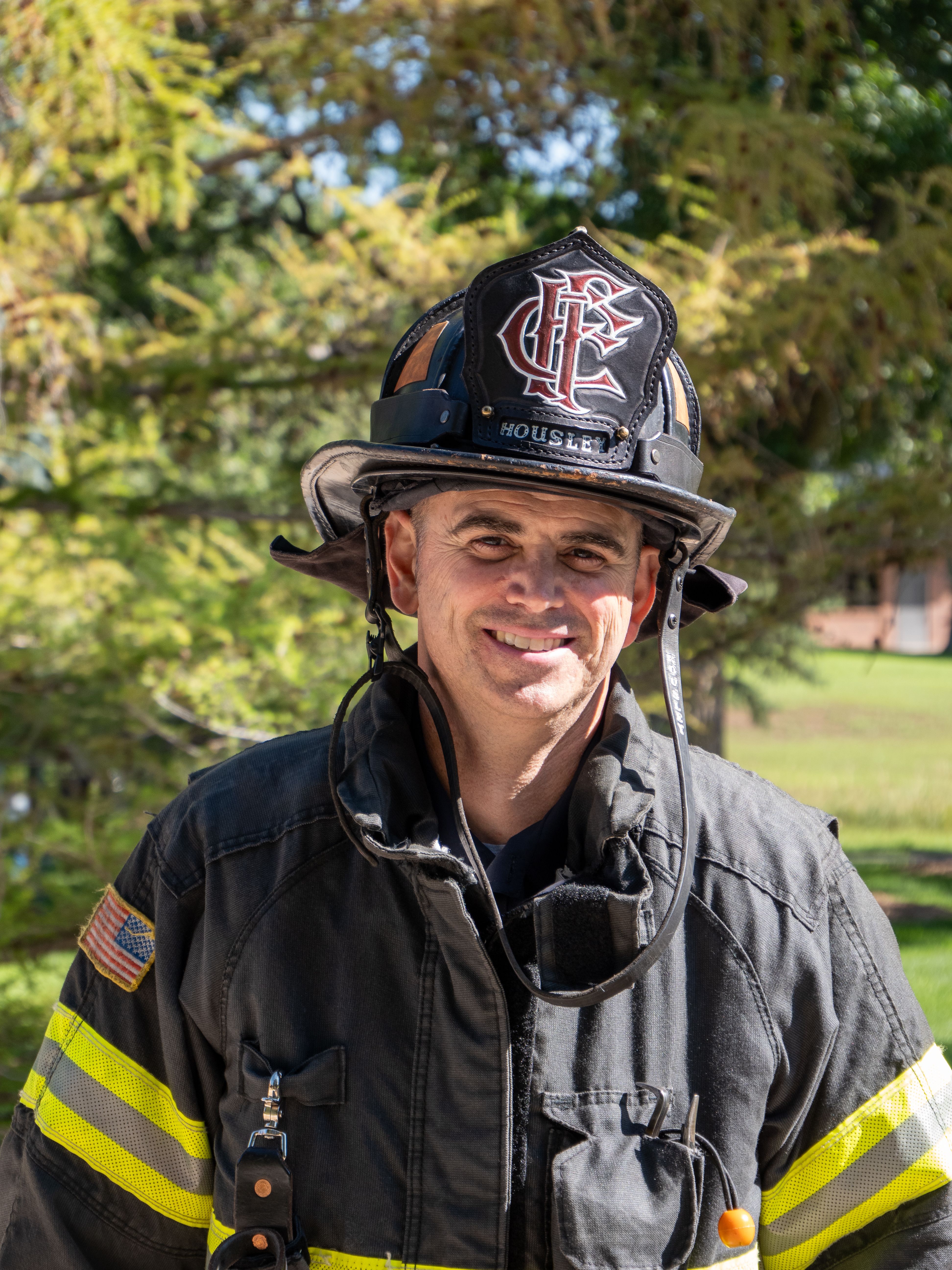Mental health in the firehouse
Firefighter Kevin Housley (BSBA ’00, MA ’24) has served his community for nearly two decades. Now, he’s focused on improving the mental health and well-being of his fellow first responders.

“A lot of times, people call you on the worst day of their life,” alumnus Kevin Housley says.
A captain with the Poudre Fire Authority, Housley has served in his hometown of Fort Collins since 2005.
When responding to calls from community members in need, he says, it’s an opportunity to “make a positive impact on that person who might have a bunch of other stuff going on that we have no idea about. That’s really what drives me.”
In 1996, Housley came to DU to study marketing at the Daniels College of Business. When he graduated, he went into marketing and real estate. But after his brother, a firefighter, recommended he do a “ride along,” he realized, “Oh, this is exactly what I want to do.”
Though marketing may not seem relevant to fighting fires, Housley says his undergraduate studies equipped him with a useful set of skills. “I was very comfortable communicating and working up the chain of command,” he says. “Being able to lead from the bottom was a skill that I learned by being in the immersive environment at DU and how the business school was run.”
He is also an instructor, teaching the next generation of first responders not only important firefighting skills but also strategies to deal with the situations they face responding to calls. According to Housley, there are three major elements to success in the fire service: physical fitness; being flawless at the basic skills; and the crucial but historically overlooked factor of mental fitness and wellness.
Noticing a lack of proactive tools for dealing with the stress, trauma, sleep deprivation and other challenges first responders face, Housley launched Firefighter Craftmanship in 2016. Through Firefighter Craftmanship, Housley provides trainings and well-being tools for first responders, a podcast and even a cookbook of healthy firehouse meals. On the podcast, Housley explores topics such as the impact of feeling heard within organizations and in personal and professional relationships; breathing techniques to mitigate stress; and how sleep is a crucial factor in emergency response.
“I'm focused on crossing the divide of sports psychology and human performance psychology, and bringing those concepts into emergency response, whether it's for EMTs and paramedics, police officers, firefighters or even our warfighters,” he says.
Addressing mental health and well-being, Housley says, is a twofold challenge. First, many of the existing tools for dealing with emotionally challenging situations are provided to first responders retroactively, rather than before they take place.
“How can you create those environments and those cultures to build resiliency before you need it? It shouldn't just be a reactionary game,” Housley says.
Second, Housley says workplace cultures have often minimized or ignored the impact that mental health and wellness can have on first responders.
“For the first 15 years or so of my career, it was just ‘Well, yeah, just suck it up, pull up your boots,’” Housley says. But over the past five years, he noticed the beginnings of a shift in workplace culture in the fire service. “We're having great conversations now, systemically, about PTSD, mental health and mental fitness.”
Housley was motivated to learn more, so in 2022, he came back to DU. Between 48-hour shifts at the fire station, Housley took online classes through the Graduate School of Professional Psychology to earn his master’s degree in sport coaching. Housley says the program sharpened his skills as a researcher and equipped him with the evidence he needed to affect change.
“I’m able to say, ‘Hey, this isn't my opinion—here's 15 peer-reviewed studies that all say the exact same thing. Now, let's sit down and have that conversation about how that applies to this situation,” Housley says. “It's given me a bit of a seat at the table.”
While he’s seen progress in workplace cultures embracing the importance of mental health and well-being, Housley says there is still plenty of work to be done. He is committed to cultivating organizational cultures that foster mental toughness and well-being and arming firefighters with proactive wellness tools.
“Unfortunately, in emergency services as a whole, you see a lot of people leave very disgruntled. And that's really unfortunate. It's a job that should really fill you up, because you do make positive impact in people's lives—no doubt about it.”
As co-chair of the Colorado chapter of the Terry Farrell Firefighters Fund, an organization that raises money to support firefighters and their families, Housley was part of an effort to incorporate an I-beam from the World Trade Center into the 9/11 Memorial at Spring Park in Fort Collins.
As co-chair of the Colorado chapter of the Terry Farrell Firefighters Fund, an organization that raises money to support firefighters and their families, Housley was part of an effort to incorporate an I-beam from the World Trade Center into the 9/11 Memorial at Spring Park in Fort Collins.


